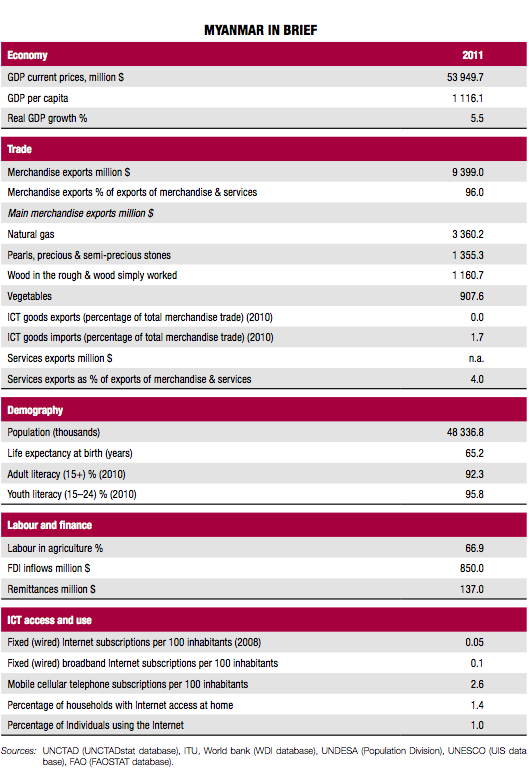Review of e-commerce legislation harmonization in the Association of Southeast Asian Nations (ASEAN) [UNCTAD/DTL/STICT/2013/1]
MYANMAR
- In Brief
- Summary
- Electronic transactions law
- Consumer protection
- Privacy and data protection
- Online content regulation
- Cybercrime and cybersecurity
- Online dispute resolution and domain-name regulation
![[ Galexia Dots ]](/images/hr.gif)
In Brief

Summary
Myanmar has several key e-commerce laws in place, including the Computer Science Development Law (1996) and the Electronic Transaction Law (2004). A Communications Law has also been drafted. The country has indicated strong interest in e-government initiatives and is encouraging electronic payments for several government services, such as those related to imports and exports.
The very low level of access to virtually all kinds of ICT infrastructure represents a huge barrier to the development of e-commerce in Myanmar.
Electronic transactions law
The Electronic Transactions Law of Myanmar 2004 adopts a media-neutral approach in regulating electronic contracts. In addition to creating electronic legal equivalents for the concepts of records, signatures and communications, the Law creates some cyber-offences and sets up a number of regulatory bodies including the Central Body of Electronic Transactions entrusted with implementing the legislation and the Electronic Transactions Control Board to look after the day-to-day regulation of electronic signatures.
While no particular technology is given a higher status, PKI is enabled by the provisions on certification authorities and licensing.
Consumer protection
There is no general consumer protection law in Myanmar at this stage. However, in November 2012 the Ministry of Commerce reported that it was developing a draft Consumer Protection Bill which it hoped to publish for public comment in 2013.
Privacy and data protection
There is no privacy law in Myanmar at this time.
Online content regulation
There are a number of provisions under Myanmar law that have the effect of restricting access to the Internet and limiting the publication of information online.
- Section 28 of the Computer Science Development Law prohibits an individual from setting up access to a computer network without the approval of the Ministry of Communications, Posts and Telegraphs.
- Section 26 of the Computer Science Development Law limits access to computers by only allowing access to a computer if the prior sanction of the Ministry is obtained. Computers used as an aid for teaching or business are exempted from this section.
- Subsection 34(d) of the Electronic Transactions Law also makes it an offence to create, modify or distribute information by electronic technology that is detrimental to the interest or lowers the dignity of a person or organization.
Cybercrime and cybersecurity
Chapter XII of the Electronic Transactions Law of Myanmar 2004 contains a number of offences that can be committed using technology used to complete electronic transactions. These include:
- Hacking or the dishonest modification or destruction of electronic records (section 34(a));
- Intercepting a communication or giving access to a communication without the permission of the originator (section 34(b));
- Communicating with another person using the electronic signature of that person without their consent (section 34(c));
- Creating or modifying information or distributing this information such that it causes detriment to the interest or lowers the dignity of an organization or person (section 34(d)).
The Computer Science Development Law 1996 also creates a number of cyberoffences. The Law was created with the intention of increasing and promoting the take-up of technology in Myanmar. Offences under the Law are contained in chapter X and include:
- Importing or possessing a computer without the approval of the Myanmar Computer Science Development Council, subject to some conditions (section 31);
- Setting up a network or access to a network without the approval of the Ministry of Communications, Posts and Telegraphs (section 32);
- Obtaining or sending information that undermines state security, the prevalence of law and order and community peace and tranquillity, national unity, state economy or national culture (section 34).
Online dispute resolution and domain-name regulation
There is no specific domain-name regulation in Myanmar. This may be addressed in the new Communications Law that is currently being drafted.

![[2018 Global Cloud Computing Readiness Scorecard]](/public/ssi/pubs/pub_1.png)
 print this page
print this page sitemap
sitemap rss news feed
rss news feed manage email subscriptions
manage email subscriptions